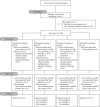Modeling and testing maternal and newborn care mHealth interventions: a pilot impact evaluation and follow-up qualitative study in Guatemala
- PMID: 27474102
- PMCID: PMC5391724
- DOI: 10.1093/jamia/ocw102
Modeling and testing maternal and newborn care mHealth interventions: a pilot impact evaluation and follow-up qualitative study in Guatemala
Abstract
Objective: To develop a descriptive model of structural characteristics of mHealth in the context of newborn nutrition, and to assess the effects of illustrative interventions through a mixed-methods study consisting of an impact evaluation and a qualitative assessment.
Materials and methods: We conducted a 23-week intervention with 100 mothers in rural Guatemala in 2013 and 2014. In group 1 ( n = 24), participants received health-promoting text messages. In group 2 ( n = 32), peer-to-peer groups were formed. In group 3 ( n = 30), peer-to-peer groups were formed, a health professional participated in the discussions, and participants received health-promoting messages. In the control group ( n = 14), participants were simply given a mobile phone. We measured changes in knowledge and self-reported behavior. Four focus groups in 2015 showed the perceptions of 44 additional women and the potential of the previously tested interventions in other marginalized areas.
Results: Significant relationships were found between group membership and changes in knowledge ( P < .001), and between changes in knowledge and self-reported behavior ( P = .010). Within peer-to-peer groups, 3665 text messages were shared; discussions covered topics such as breastfeeding practices, health concerns, and emotional issues. Focus groups revealed a deficit of support for mothers, a precariousness of public services, different cultural barriers affecting access to care, and the potential for scaling up.
Discussion: The complementarity of structural arrangements of mHealth interventions can play an important role in helping to encourage recommended breastfeeding attitudes along with providing rich information about challenges in rural areas.
Conclusion: A mixed-methods study was appropriate to compare the effects and assess the potential of mHealth strategies in a complex rural setting.
Keywords: breastfeeding; comparison; knowledge; mixed methods; mobile; self-reported behavior.
© The Author 2016. Published by Oxford University Press on behalf of the American Medical Informatics Association.
Figures
References
-
- Chib A, van Velthoven MH, Car J. mHealth adoption in low-resource environments: a review of the use of mobile healthcare in developing countries. J Health Commun 2015;20(1):4–34. - PubMed
-
- Derenzi B, Borriello G, Jackson J, et al. Mobile phone tools for field-based health care workers in low-income countries. Mt Sinai J Med 2011;78(3):406–418. - PubMed
MeSH terms
LinkOut - more resources
Full Text Sources
Other Literature Sources
Medical



